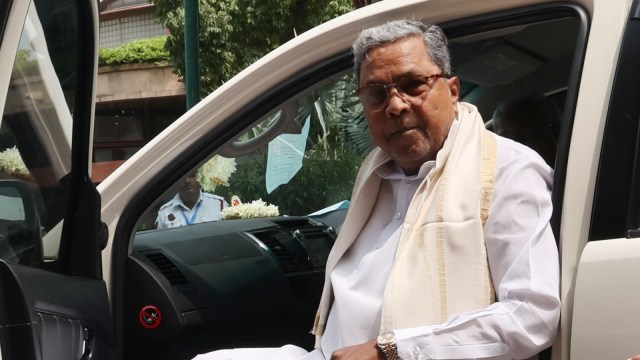Karnataka HC upholds Governor’s nod for graft cases against Siddaramaiah in MUDA ‘scam’ case: ‘no fault can be found’
The Karnataka High Court ruled that the Governor's order to grant sanction for filing of cases against Siddaramaiah in the alleged MUDA scam does not suffer from lack of application of mind.
 Karnataka CM Siddaramaiah (Express File Photo)
Karnataka CM Siddaramaiah (Express File Photo)The Karnataka High Court on Tuesday dismissed a petition filed by Karnataka Chief Minister Siddaramaiah against an approval granted by Governor Thawar Chand Gehlot to three private individuals to file cases of corruption against him over a land grant to his wife by the Mysore Urban Development Authority (MUDA).
Justice M Nagaprasanna ruled that the Governor’s August 16 order to grant sanction for filing of cases against Siddaramaiah does not suffer from lack of application of mind. The high court pointed out that the reasons for granting the sanction had been detailed in the files of the Governor and did not have to be brought into the final sanction order.
“No fault can be found with the Governor exercising independent discretion to pass the impugned order. It would suffice if the reasons were recorded in the file of the decision-making authority particularly of the high office and those reasons succinctly formed part of the impugned order. A caveat is that reasons must be in the file,” Justice Nagaprasanna said in a summary of findings while dismissing Siddaramaiah’s petition.
“Reasons for the first time cannot be brought before the constitutional court by way of objections. The gubernatorial order nowhere suffers from the want of application of mind. It is not a case of not even a semblance of application of mind by the Governor but the abundance of application of mind,” Justice Nagaprasanna stated.
The “grant of an opportunity for hearing prior to grant of approval under Section 17 A [of the Prevention of Corruption Act, 1988] is not mandatory if the authority chooses to do so it is open to it,” the HC said.
The high court ruled the Governor had not taken a hasty decision to sanction the approval to file cases against Siddaramaiah despite the Karnataka chief minister’s advocates arguing that the approval was given within 20 days of being sought while approvals for investigations against some former BJP ministers had been pending for over two years.
“A decision of the Governor of alleged hot haste has not vitiated the order. The order is read to be restrictive to approval under section 17 A of the Act and not an order granting sanction under section 218 of the BNSS (for prosecution),” the HC ruled in its order.
The Karnataka High Court ruled that anti-corruption activists T J Abraham, Snehamayi Krishna and Pradeep Kumar, who sought the sanction, were justified in approaching the Governor for seeking sanction under Section 17 A of the Prevention of Corruption Act, 1988, as amended in 2018.
The court also ruled that the approval of the competent authority, which in this case is the Governor, is mandatory for beginning an inquiry or probe against a public servant under Section 17 A of the Act. “The approval under Section 17 A of the PC Act is mandatory in the current situation. Section 17 A nowhere requires a police officer to seek approval in a private complaint registered under Section 200 of CrPC or 223 of the BNSS against a public servant for offences punishable under the provisions of the Act,” Justice Nagaprasanna reiterated.
“It is the duty of the complainant to seek such approval. The Governor in the normal circumstance has to act under the aid and advice of the Council of Ministers as contained in Article 163 of the Constitution of India but can make an independent decision in exceptional circumstances and the present case projects one such exception,” said Justice Nagaprasanna.
The facts of the case require an investigation since the grant of land by MUDA is to the family of the Karnataka CM and only an investigation can reveal if corruption is involved, the high court observed. “The facts narrated in the petition would undoubtedly require investigation. In the teeth of the fact that the beneficiary of all these acts is not anybody outside but the family of the petitioner. The petition stands dismissed,” the court said.
Where does Siddaramaiah stand now?
Siddaramaiah, who has the backing of the Congress party as its foremost backward class leader, is expected to file an appeal in the Supreme Court against the Karnataka High Court order.
In the course of the hearing of Siddaramaiah’s petition, the high court temporarily stayed the proceedings in private complaints filed by Abraham, Krishna, and Kumar before a special court in Bengaluru. The high court order is expected to pave the way for proceeding to resume in the form of an order on the private complaints.
If the complainants are asked to approach an anti-corruption investigating agency like the Karnataka Lokayukta with their complaint by the special court an FIR is likely against Siddaramaiah on account of the approval of the Governor as mandated under Section 17 A of the PC Act.
The counsel for Siddaramaiah sought an extension of the stay on proceedings in the special court to facilitate the filing of appeal but Justice Nagaprasanna said that it would not be possible but indicated that the final orders in the CM’s case will be made available at the earliest.
The filing of an FIR in the corruption complaints against Siddaramaiah is expected to result in pressure for his resignation by the Opposition BJP. Some Congress leaders have suggested Siddaramaiah’s resignation would not be sought until the legal battle plays out to its full extent. His close associates have suggested that his exit based on the filing of FIRs could result in similar tactics being employed by the opposition in other states as well in the future.
On September 12, the high court reserved its judgement after marathon arguments in the writ petition filed by Siddaramaiah on August 19 against the August 16 decision of Governor Thawar Chand Gehlot to allow three private individuals to seek investigations against the chief minister over the allotment of 14 housing sites by MUDA to his wife in Mysuru in 2021 during the Bharatiya Janata Party (BJP)’s tenure.
Karnataka Governor Thawar Chand Gehlot gave his nod on August 16 to Abraham, Krishna, and Kumar to file cases seeking a probe against Siddaramaiah over the 2021 allotment of 14 housing sites in Mysuru to Siddaramaiah’s wife in exchange for 3.16 acre of land.
The three approached the Governor in July for the sanction alleging corruption in the acquisition of 3.16 acre of land in the Kesare village in 2004 by Siddaramaiah’s brother-in-law B M Mallikarjun, who gifted the land in 2010 to his sister Parvathi B M, and its subsequent exchange in 2021 for 14 housing sites by MUDA under a 50:50 scheme under which land equivalent to half the acquired land is allotted in a developed area.







